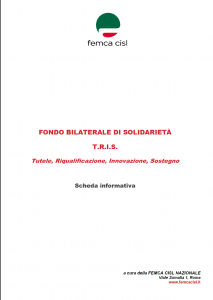In some sectors, the Intergenerational Solidarity Pact is supported by bilateral funds established by social partners at sectoral level. Italian social partners affect active ageing through two channels: bilateral bodies and collective bargaining. These two sources are complementary and organised through the principle of subsidiarity. Sectoral bilateral bodies are the main result of cooperative industrial relations in Italy under which active ageing policies can be better understand, justified and managed.In the context of the Italian system of industrial relations, the expressions “bilateral bodies” or “joint bodies” are used to refer to entities that are set up and regulated by means of collective bargaining and that have three main features: 1) they consist of representatives from social partners who conclude collective agreements through which such bodies are governed; 2) provide (employment) services and protection to both workers and employers in accordance to what is laid down by collective agreements and by statutory laws. Funds to such activities are collected by means of contributions paid by employers and – to a minor extent – by workers; 3) upon the free choice of the parties that comprise them, bilateral bodies are autonomous legal entities.

Beyond collective bargaining, bilateral bodies are also mentioned as a source of regulation and financing of active ageing policies. Training funds, integrative pension schemes and healthcare funds are positive examples of how social partners can create an ecosystem of resources and services to respond to an ageing workforce. However, these instruments are transversal: it is up to the single companies, their workers’ representatives and the workers to activate those instruments to deal with age-related problems.
The role played by bilateral bodies in terms of occupational health and safety is relevant, as they are legally assigned special functions and needed to provide special services. Legislative Decree No. 276/2003 and, more recently, the consolidating legislation on health and safety at work (Implementing Decree No. 81 of 9 April 2008, subsequently amended by Legislative Decree No. 106 of 3 August 2009), view the joint bodies as a channel to promote, steer, and support both employers and employees which should lean on a participatory model to develop strategies concerning health and safety. In practical terms, such legislative support is evident if one considers two funding schemes. Art. 52, sec. C provides for a special fund set up by the National Institution for Insurance against Accidents at Work (INAIL) that supports activities carried out by joint bodies. Further, Art. 51, par. 3-bis allows for the usage of ad-hoc funds (fondi interprofessionali), or funds for temporary agency workers in order to finance health and safety training programmes. Of relevance is also the fact that – pursuant to Legislative Decree No. 106/2009 – employers can be awarded with a certificate showing that effective OHS management practices and organizational models have been adopted. The fulfilment of these tasks on the part of bilateral bodies also ensures their involvement in terms of health and safety governance, on the assumption that such a participatory model contributes to building a safety culture in the company, increasing the minimum levels of protection in the working environment.
On the subject of training, that is considered as a common good and can help to promote employability and competitiveness, the Italian legislator has provided a significant number of provisions to allow bilateral bodies to carry out activities with regard to vocational training. The most important measure is the establishment of the special funds for life-long learning (called interprofessional joint funds for life-long training – fondi paritetici interprofessionali per la formazione continua), that are to be laid down in interconfederal agreements among the largest employers’ associations and trade unions at a national level. The direct involvement of bilateral and joint bodies in the provision of lifelong learning constitutes an attempt to experiment with and further develop supplementary welfare schemes to guarantee that workers are offered adequate protection, result of the relationship between active and passive labour market policies.
Bilateral bodies also provide a decisive contribution in terms of income support measures, by administering the mutual assistance of funds that support workers operating in those industries that do not envisage wage guarantee funds. Regarding active ageing, bilateral bodies guarantee income support for older workers that have accessed to early retirement, supplementing the resources offered by public welfare schemes, but also another measures. For example, in the 90’s the National sectoral collective agreement (NCLA) of the banking sector introduced a solidarity fund (fondo di solidarietà[1]) entirely self-financed by the banks, formalized by a specific regulation of INPS, which finance the reduction of working time, professional training and early retirement of older workers. In 2012, the FOC[2] was created (National Employment Fund). The objective of this fund is to promote the creation of new stable employment and to guarantee a reduction in costs for a predetermined period for companies that hire workers with an open-ended employment contract, in particular promoting intergenerational solidarity and fairness of the contribution to the Fund. A provision of the NCLA renewed in 2015 invites the managerial staff to contribute 4% of their fixed salary to the FOC.
Also in the energy, fashion and chemistry sector a bilateral fund of solidarity has been adopted (Fondo TRIS)[3]. The main objective is to manage business processes of innovation, intergenerational relay and active ageing, by using current legislative instruments to promote early retirement by guaranteeing income support and the payment of social security contributions. The fund also guarantees income support in case of reduction of working time.
In several sectors, social partners established so-called bilateral funds for integrative pensions and/or for integrative health assistance. All the workers, employed by a company that applies the national sectoral collective agreement that established the bilateral funds, are covered by an integrative pension fund/health assistance. The funds are financed through shared contributions from workers and companies. In some sectors, there are also specific integrative funds for managerial staff.
Complementary or voluntary healthcare insurance is one of older workers’ main needs because, generally, ageing involves health problems and older workers use an important amount of their salary for healthcare. Therefore, sector health bilateral funds represent an important instrument to protect workers’ savings also because they can be extended to workers’ family. In several sectors, social partners established so-called bilateral funds for integrative health assistance[4]. Nonetheless, these actions are not negotiated within the active ageing policy framework. Their justification and articulation respond to other reasons (e.g. contrasting welfare state retrenchment, redistribution, increasing working time flexibility etc.), although indirectly they can be regarded as “active ageing measures”.
In a similar vein, bilateral bodies in many industries have set up pension funds to complement public pension schemes. There are the so-called fondi di pensione[5]. All the workers, employed by a company that applies the NCLA that established the bilateral funds, are covered by an integrative pension fund/health assistance. The funds are financed through shared contributions from workers and companies. In some sectors, there are also specific Integrative funds for managerial staff.
Bilateral bodies can also provide placement services and this is among the most relevant functions assigned to bilateral bodies by law. The idea to authorize trade unions to serve as placement providers – also indirectly via bilateral bodies – arises from the assumption that they can protect workers not only by negotiating the best working conditions, but also by administering services that help the unemployed and first-time job-seekers access or re-enter the labour market.
[1] https://www.abi.it/Pagine/Lavoro/Relazioni-sindacali/Fondo-di-solidarietà.aspx
[2] https://www.abi.it/Pagine/Lavoro/Relazioni-sindacali/Fondo-Nazionale-occupazione.aspx
[3] http://www.femcacisl.it/wp-content/uploads/2018/03/FondoTRIS.pdf
[4] For example, Fondo EST for trade and tourism sector http://www.fondoest.it
[5] For example, Fondo Fon.Te. for trade and tourism sector https://www.fondofonte.it








